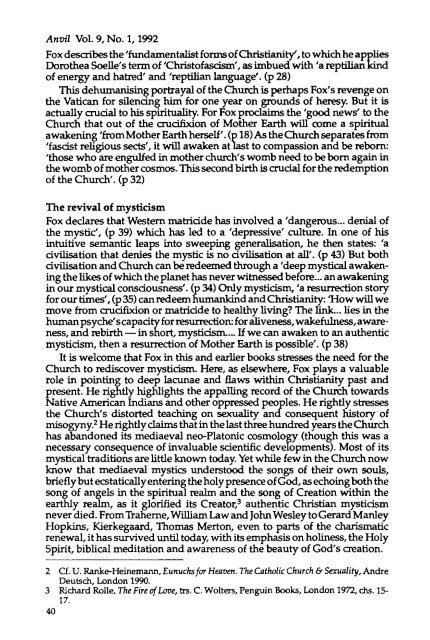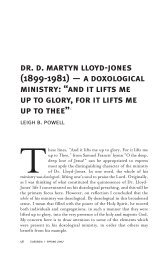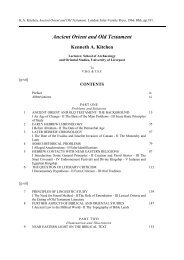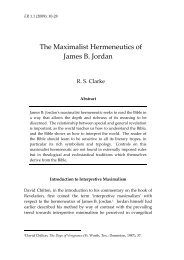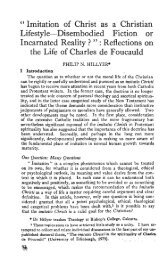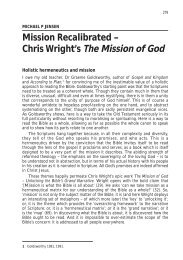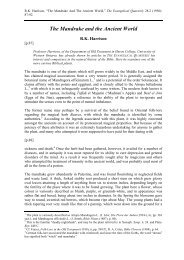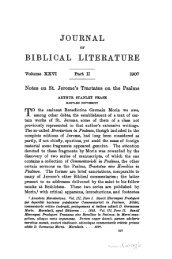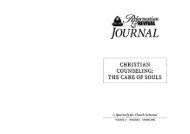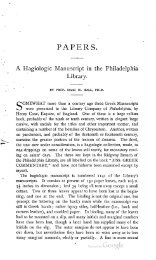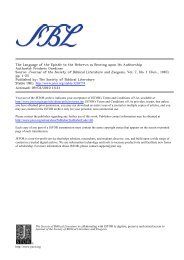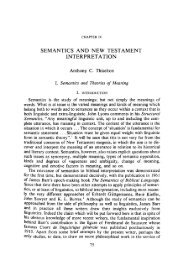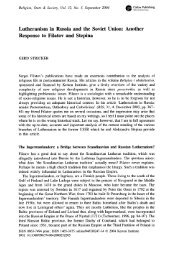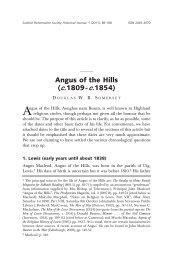Margaret Brearley, "Matthew Fox and the Cosmic Christ," Anvil 9.1
Margaret Brearley, "Matthew Fox and the Cosmic Christ," Anvil 9.1
Margaret Brearley, "Matthew Fox and the Cosmic Christ," Anvil 9.1
You also want an ePaper? Increase the reach of your titles
YUMPU automatically turns print PDFs into web optimized ePapers that Google loves.
<strong>Anvil</strong> Vol. 9, No. 1, 1992<br />
<strong>Fox</strong> describes <strong>the</strong> 'fundamentalist forms of <strong>Christ</strong>ianity', to which he applies<br />
Doro<strong>the</strong>a Soelle' s term of '<strong>Christ</strong>ofascism', as imbued with 'a reptilian kind<br />
of energy <strong>and</strong> hatred' <strong>and</strong> 'reptilian language'. (p 28)<br />
This dehumanising portrayal of <strong>the</strong> Church is perhaps <strong>Fox</strong>'s revenge on<br />
<strong>the</strong> Vatican for silencing him for one year on grounds of heresy. But it is<br />
actually crucial to his spirituality. For <strong>Fox</strong> proclaims <strong>the</strong> 'good news' to <strong>the</strong><br />
Church that out of <strong>the</strong> crucifixion of Mo<strong>the</strong>r Earth will come a spiritual<br />
awakening 'from Mo<strong>the</strong>r Earth herself'. (p 18) As <strong>the</strong> Church separates from<br />
'fascist religious sects', it will awaken at last to compassion <strong>and</strong> be reborn:<br />
'those who are engulfed in mo<strong>the</strong>r church's womb need to be born again in<br />
<strong>the</strong> womb of mo<strong>the</strong>r cosmos. This second birth is crucial for <strong>the</strong> redemption<br />
of <strong>the</strong> Church'. (p 32)<br />
The revival of mysticism<br />
<strong>Fox</strong> declares that Western matricide has involved a 'dangerous ... denial of<br />
<strong>the</strong> mystic', (p 39) which has led to a 'depressive' culture. In one of his<br />
intuitive semantic leaps into sweeping generalisation, he <strong>the</strong>n states: 'a<br />
civilisation that denies <strong>the</strong> mystic is no civilisation at all'. (p 43) But both<br />
civilisation <strong>and</strong> Church can be redeemed through a 'deep mystical awakening<br />
<strong>the</strong> likes of which <strong>the</strong> planet has never witnessed before ... an awakening<br />
in our mystical consciousness'. (p 34) Only mysticism, 'a resurrection story<br />
for our times', (p 35) can redeem humankind <strong>and</strong> <strong>Christ</strong>ianity: 'How will we<br />
move from crucifixion or matricide to healthy living? The link. .. lies in <strong>the</strong><br />
human psyche's capacity for resurrection: for aliveness, wakefulness, awareness,<br />
<strong>and</strong> rebirth- in short, mysticism. ... If we can awaken to an au<strong>the</strong>ntic<br />
mysticism, <strong>the</strong>n a resurrection of Mo<strong>the</strong>r Earth is possible'. (p 38)<br />
It is welcome that <strong>Fox</strong> in this <strong>and</strong> earlier books stresses <strong>the</strong> need for <strong>the</strong><br />
Church to rediscover mysticism. Here, as elsewhere, <strong>Fox</strong> plays a valuable<br />
role in pointing to deep lacunae <strong>and</strong> flaws within <strong>Christ</strong>ianity past <strong>and</strong><br />
present. He rightly highlights <strong>the</strong> appalling record of <strong>the</strong> Church towards<br />
Native American Indians <strong>and</strong> o<strong>the</strong>r oppressed peoples. He rightly stresses<br />
<strong>the</strong> Church's distorted teaching on sexuality <strong>and</strong> consequent history of<br />
misogyny. 2 He rightly claims that in <strong>the</strong> last three hundred years <strong>the</strong> Church<br />
has ab<strong>and</strong>oned its mediaeval neo-Platonic cosmology (though this was a<br />
necessary consequence of invaluable scientific developments). Most of its<br />
mystical traditions are little known today. Yet while few in <strong>the</strong> Church now<br />
know that mediaeval mystics understood <strong>the</strong> songs of <strong>the</strong>ir own souls,<br />
briefly but ecstatically entering <strong>the</strong> holy presence of God, as echoing both <strong>the</strong><br />
song of angels in <strong>the</strong> spiritual realm <strong>and</strong> <strong>the</strong> song of Creation within <strong>the</strong><br />
earthly realm, as it glorified its Creator,3 au<strong>the</strong>ntic <strong>Christ</strong>ian mysticism<br />
never died. From Traherne, William Law <strong>and</strong> John Wesley to Gerard Manley<br />
Hopkins, Kierkegaard, Thomas Merton, even to parts of <strong>the</strong> charismatic<br />
renewal, it has survived until today, with its emphasis on holiness, <strong>the</strong> Holy<br />
Spirit, biblical meditation <strong>and</strong> awareness of <strong>the</strong> beauty of God's creation.<br />
2 Cf. U. Ranke-Heinemann, Eunuchs far Heaven. The Catholic Church & Sexuality, Andre<br />
Deutsch, London 1990.<br />
3 Richard Rolle, The Fire of Love, trs. C. Wolters, Penguin Books, London 1972, chs. 15-<br />
17.<br />
40


